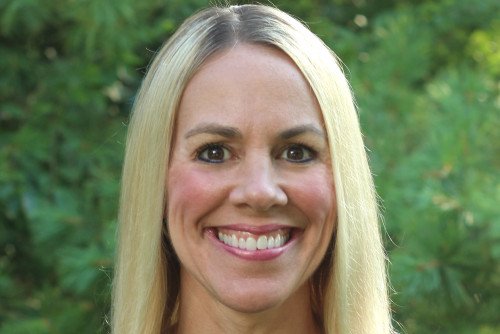
By Samia Williams
Inspired by wanting to better understand her oldest son, Michael, and his concentration “issue” that causes him anxiety, Dr. Krista Tucciarone, or Dr. “Tucc,” personally reached out to her own students at Lindenwood University about their own “issues" and how these issues might be causing them anxiety, too. After an “overwhelming number” of students relaying that they experienced plights similar to Michael, Dr. Tucc knew she had to delve deeper into the problem to “determine the degree anxiety affects college students.”
Fueled by the passion behind this inquiry, she “scanned the advertising file cabinet in [her] brain, [yet] could not recall higher education advertisements that focused on mental health.” Dr. Tucc then came to a sudden realization: more often than not, when universities advertise their campuses, they show the favorable materialistic aspects of the campus, such as, “fancy dorm rooms, climbing walls, arcade rooms, sushi in dining halls, designer coffees, and state-of-the-art recreational facilities,” rather than opting to connect with students on a deeper level. As of now, to Dr. Tucc, the circumstances imposed by these advertising techniques feel transactional, and there must be something done to promote “education for the whole person, not just academics."
Dr. Tucc’s manuscript focuses on challenging this advertising mentality by exploring the manners in which “college[s] need to be about cognitive, emotional, and social development, which are rooted in ones’ sense of connection and worth,” in order to provide students with a community that’s open to discussing mental health, and how colleges could be better suited to meet these needs. According to Dr. Tucc’s primary research, she learned that 85% of the participants experienced anxiety in college (accounting for varying degrees and durations): meaning, 85% of students at Lindenwood University felt “‘overwhelmed’ with responsibilities in the last year, and 42% rated their anxiety as the top concern.” In addition to this, the research also revealed that many students feel as if they’re alone, which would in turn explain why a substantial number of students during freshman year “experience their first mental break” as they exist on campus, for the first time, in pseudo-isolation disguised as adulthood.
It’s important to always consider the emotional health of the students, and it’s imperative that colleges take the time to support their student’s emotional mind, just as much as colleges are determined to support their students’ academic mind. Dr. Tucc notes that, “the result that [she] really did not anticipate was that college students today have to be their best at all times, or they feel like things will fall apart,” and her research is dedicated to uncovering these concerns, and appropriately face them head-on with more advertisements exemplifying more than a materialistic growth in an academic environment, but an emotional, and humanistic one as well.
What all started as an open moment between mother and son, blossomed into something quite powerful. It’s clear from “Advertising Anxiety Resources to Increase Enrollment and Support Student Mental Health,” that the college campus is meant to dedicate itself to providing a safe, enjoyable platform for students to not only grow academically, but to also explore the bounds of their identity within a community that’s doing the same to grow emotionally, as well. Therefore, it’s important to not only advertise the academic capabilities of the college, but it’s even more so imperative to develop advertising that shows students that the school is here to always support them through the worst of times, and the best times.
It’s through advertisements such as those that more students will feel inclined to enroll, as when they submit their applications, they know that the institution on the other side sees them more than just a number, but a person on a new, amazing path. With this new mentality, colleges can ensure their students don’t feel alone, overwhelmed, or nearing an emotional breakdown: with this new mentality, colleges have the potential to support students as they become the greatest next leaders that they can be, free of those infamous “issues.”
Thank you to Michael and student participants, for being open to share your anxieties to make a difference, and thank you to Dr. Tucc, for cultivating new ideas to promote healthy living to college-aged individuals.
P.S: If you’re a student who needs to talk to someone about your anxiety, don’t ever hesitate to reach out to those around you—who might be feeling similar—or, the Student Counseling and Resource Center (SCRC) for professional assistance. At Lindenwood University, we’re determined to ensure that our students never have to feel alone, if we can help it.

The Linden Gold
The Linden Gold is a student operated organization focusing on promoting the academic success and achievements of Lindenwood. Through stories about alumni, current students, and faculty alike, The Linden Gold strives to engage with the St. Charles Community and showcase the unique greatness of Lindenwood.












